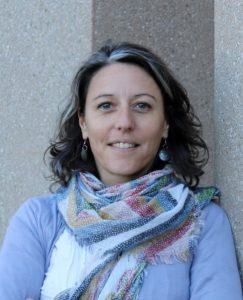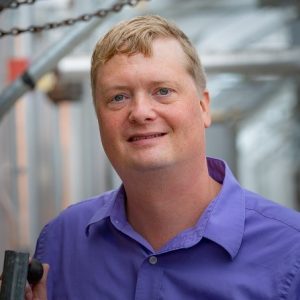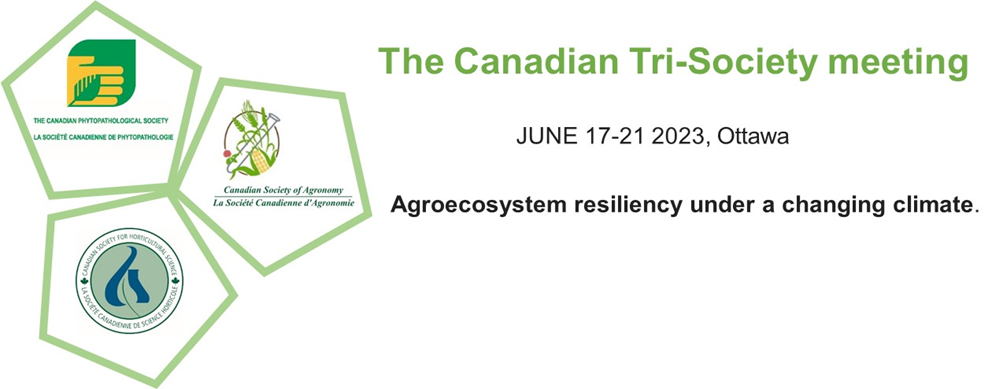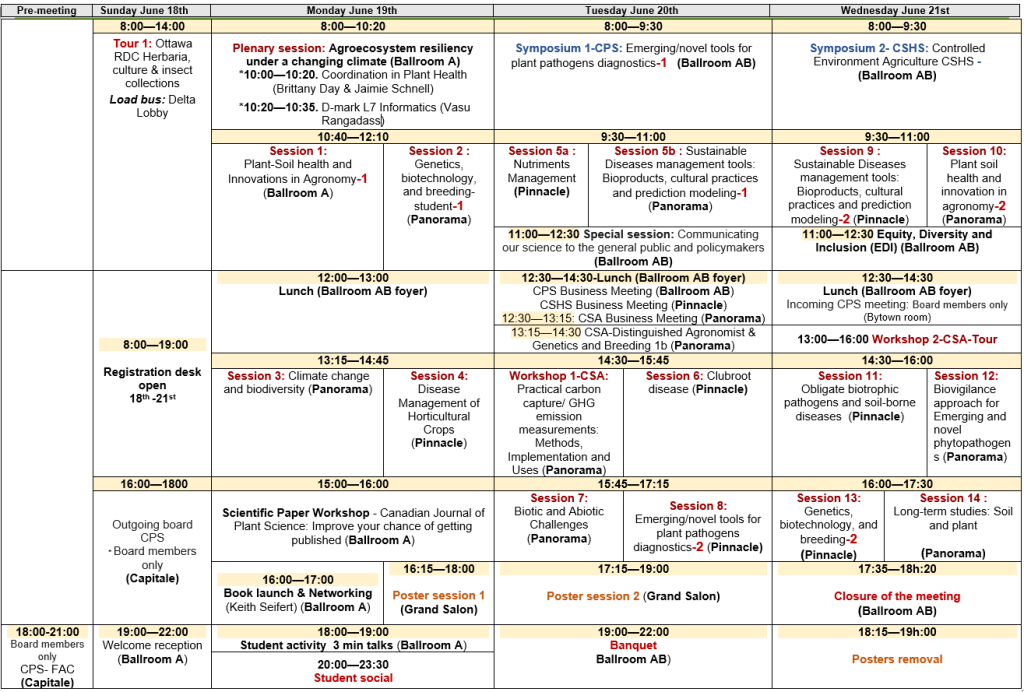Date
17/06/2023 - 21/06/2023
Location
Delta Hotels by Marriott Ottawa City Centre
101 Lyon St. N
Ottawa, Ontario
The 2023 Canadian Tri-Society Meeting will be held in Ottawa on June 17-21.
The Canadian Tri-Society meeting of the Canadian Phytopathological Society (CPS), the Canadian Society of Agronomy (CSA) and Canadian Society for Horticultural Science (CSHS) will be held on June 17th to 21st 2023 at the Delta hotel, Ottawa, ON.
Thematic of the meeting: Agroecosystem resiliency under a changing climate.
This major scientific meeting provides distinguished lecturers, networking opportunities, innovative scientific discoveries to be reported in oral and poster sessions, and technical workshops-tours.
This conference will be the premier opportunity for professionals working in plant sciences to hear about the latest research, meet and learn from their peers, expand their knowledge base, and take advantage of networking opportunities to enhance their careers.
Hotel information:
The Tri-Society negotiated a room rate of $235-250 CAD per night at the
Delta Hotels Ottawa City Centre
101 Lyon Street North Ottawa, Ontario K1R 5T9 (+1 613-237-3600)
The deadline for this conference room rate is May 22.
*By booking at the Delta the Tri-society meeting gets a better rate for hotel conference and catering fees.
Book your conference hotel rate for the meeting.
Sponsors
Program:
Full Program book
Special session: Book launch &Networking (Keith Seifert)
Special session: Communicating our science to the general public and policymakers
Special session: Equity, Diversity and Inclusion (EDI)
Plenary session: Agroecosystem resiliency under a changing climate.
Key Note Speakers
 SPEAKER: Amélie Gaudin
SPEAKER: Amélie Gaudin
Department of Plant Sciences at the University of California Davis, Davis, California, U.S.A..
TITLE: Building Agroecosystem Resiliency to a Changing Climate
ABSTRACT: Diversifying and re-designing cropping systems based on agroecological principles can provide new avenues to mitigate climate risks in agriculture. I will share the resilience building potential of several strategies implemented and tested by California and Midwest farmers and discuss some of the mechanistic underpinnings. I will conclude with research needs to enhance adoption and impacts.
BIO: Dr. Amélie Gaudin is Associate Professor and Endowed Chair of Agroecology in the Department of Plant Sciences at the University of California Davis. She obtained a Ph.D. in Plant Agriculture at the University of Guelph (Canada) and worked as an agronomist and crop physiologist at various CGIAR centers to sustainably intensify staple food crop production in smallholder farming systems. She currently leads a dynamic and diverse team of students and postdoctoral researchers to characterize outcomes of regenerative agricultural models that have conservation of natural resources, agrobiodiversity, and ecosystem services as a basis for improvements. She engages communities with the science of agricultural ecology by collaborating with and learning from a diverse group of students, growers, advisors, and policy advocates. Her research integrates concepts and methodologies from various disciplines to measure multifunctional outcomes of ecological intensification and regenerative strategies on soil health, C sequestration and drought resilience. She is also interested in better understanding root system and rhizosphere ecology and their potential to harness improvements in soil health, sequester carbon and decrease crop water and nutrients requirements. More information here: http://gaudin.ucdavis.edu
 SPEAKER: Neil Mattson
SPEAKER: Neil Mattson
School of Integrative Plant Science, horticulture section at Cornell University, Ithaca, New York, U.S.A.
TITLE: Optimizing plant quality, environmental, and socioeconomic outcomes of controlled environment agriculture crops
ABSTRACT: The production of high nutrient density crops in controlled environment agriculture (CEA, i.e. greenhouses and vertical farms) allows for high yielding, year-round food production. CEA is one tool to address food system resiliency under a changing climate. CEA has seen increased attention from investors but there is a lack of information on successful models, especially urban production and vertical farming. Mattson leads an NSF-funded project that seeks to better understand the benefits and constraints of urban CEA including: economics, natural resource use, carbon footprint, and nutrition. Mattson will discuss related research that seeks to optimize crop performance and energy/water use through strategic LED lighting and light spectrum and precise control algorithms for light and carbon dioxide. Engaging the next generation of CEA workers is crucial if the industry is to expand. Mattson will discuss efforts of the NSF project to define workforce development needs by the nascent CEA industry and a new USDA workforce development project to expand training opportunities in CEA for 2-year colleges and lifelong learners.
BIO: Dr. Neil Mattson is Professor and greenhouse extension specialist within the Horticulture Section, School of Integrative Plant Science at Cornell University. Prior to joining Cornell in 2007, Dr. Mattson completed his PhD in Plant Biology and UC Davis and his M.S. in Horticulture at the University of Minnesota. Dr. Mattson researches technologies to reduce natural resource use in greenhouse floriculture and vegetable production while maintaining or improving profitability. Particular interests include plant responses to light quantity and quality, energy efficient light control strategies, and optimizing crop nutrient management. Dr. Mattson has authored or co-authored 69 peer-reviewed journal articles, 15 book chapters, 169 extension articles and has given more than 300 outreach presentations to more than 16,000 greenhouse industry members. Dr. Mattson is the director of Cornell University’s Controlled Environment Agriculture program. nsm47@cornell.edu
 SPEAKER: Mario Tenuta
SPEAKER: Mario Tenuta
Department of Soil Science, University of Manitoba, Winnipeg, Manitoba, Canada
TITLE: The Evolving Role of Nitrogen Management in Crop Production
ABSTRACT:
Nitrogen (N) supply to crops is one of the most important determinants of crop yield and input cost for farmers. Further nitrogen availability is for the quality of crop products, plant health and disease tolerance. There is no doubt of synthetic nitrogen fertilizers’ great contribution to increasing global food production. However, the greater use of nitrogen in cropland has ramifications for water and atmospheric quality, greenhouse gas emissions and deposition (fertilization) of natural systems. Understandably nitrogen management in croplands has been more concerned with productivity and, to a lesser extent, environmental consequences. With a necessity for reducing greenhouse gas emissions (GHG) and achieving net zero emissions, the objectives of nitrogen management are changing. The N fertilizer supply chain accounts for 2.1% of global GHG emissions (1% of each production and soil emissions and 0.06% transportation of fertilizers). However, this doesn’t account for livestock manure emissions, where about half of the nitrogen animals consume comes from fertilizers. We are using fertilizer N in croplands better. Improvements in nitrogen use efficiency in highly productive-input systems, such as Canada, are evident. Important regions with poor use efficiency, such as China, are also beginning to improve. However, there will be 1.75-2 billion more people by 2050, with increases greatest for sub-Saharan Africa and Central and South Asia. Areas depend on importing grains and oilseeds and using relatively low amounts of N fertilizer. To feed the global population in 2050, an increase of 37% in nitrogen addition to cropland is required. Farmers have always considered the return on investment of nitrogen cost, but that interest ebbs and flows depending on the cost of fertilizer. Recently fertilizers have reached unprecedented high costs.
Unsurprisingly, how farmers manage N fertilizer is changing, with more attention given to minimizing environmental consequences, improving nitrogen use efficiency, and increasing return on investment. The 4 R Nutrient Stewardship framework of applying nutrients at the right rate, source, placement and timing gives farmer and researcher a means to manage N better.
Research by the 4R Industrial Research Chair Program over the past 12 years has shown that for highly productive, input-intensive agriculture, such as in Western Canada, applying the 4Rs doesn’t usually increase yields. However, the 4Rs significantly reduce N losses to the environment, which is critical to achieving Canada’s GHG reduction targets for 2030. We have found reductions in nitrous oxide (N2O) emissions from cropland to be reduced in order Legumes > Split N Application > Nitrification inhibitors > Controlled Release N Fertilizer. Moving forward, it is important to dedicate research and outreach to reduce losses, GHG emissions and improve the use efficiency of N fertilizer because N rates applied to cropland will continue to go up as yields increase. Greater attention will be given to reducing indirect emissions of N2O from ammonia volatilization and leaching of fertilizers. There is much room for increased use of 4R practices by farmers. Though the adoption of 4R practices may not result in yield increases, it should allow the use of N additions more efficiently and reduce rates, by how much we know. Developing more sophisticated 4R practices is underway, particularly in the area I term Precision 4R Management. Here fields are managed for N individually with attention to management zones and landscape positions within fields. 4R practices cost farmers money and are a significant barrier to greater adoption of practices. Recently governments have rolled out cost-sharing programs to offset the cost of implementing 4R practices. Another means of offsetting increased costs is selling GHG credits to C markets, though such a market mechanism is not developed in Canada. An exciting means to reduce GHG emissions from the production of N fertilizer is using renewable energy, primarily electricity, to produce “green ammonia” instead of natural gas. Lastly, change in consumer preference and behaviour to greater pulse and plant protein consumption will lessen demand for synthetic N and more reliance on biologically produced N, which has a lot less GHG emissions.”
BIO: Dr. Mario Tenuta P.Ag., is the Natural Science and Engineering Council/Western Grains Research Foundation/Fertilizer Canada Senior Industrial Research Chair in 4R Nutrient Stewardship and Professor of Applied Soil Ecology at the University of Manitoba. His training includes a B.Sc. in Botany and Physical Geography, an M.Sc. in Soil Fertility, a Ph.D. in Plant Pathology, and Post-Doctoral research in Nematology. The 4R Industrial Research Chair Program is advancing research in 4R nitrogen management practices to give farmers and industry solutions to achieving nitrous oxide emission reductions and improved soil health and crop productivity. A key feature of the Chair program is conducting farm-based research with particular attention to the outreach of findings to farmers, industry and policy-makers. mario.tenuta@umanitoba.ca
Twitter: @soilecologyUMan
To learn more about Mario and the Chair program, please visit www.soilecology.ca
Technical sessions:
Plant-Soil health and Innovations in Agronomy
Climate change and biodiversity
Disease Management of Horticultural Crops
Controlled Environment Agriculture (CEA)
Genetics, Biotechnology, and Breeding
Biotic and Abiotic Challenges
Sustainable Disease management tools: Bioproducts, cultural practices and prediction modeling
Emerging/novel tools for plant pathogens diagnostic
Biovigilance approach for Emerging and novel phytopathogens
Obligate biotrophic pathogens and soil-borne diseases
Workshops-Tours***
***Please note that tours will be limited to 40 people except the Ottawa RDC tour which will be limited to 30 people. You need to register and a fee of $35 will be charged for each tour. Please see the preliminary program for info on the tour schedule.
- Tour of the Ottawa RDC herbaria, culture collections, and the insect collections (June 18, Sunday).
- Turf special session (cancelled)
- True field day (June 21, Wednesday afternoon)
- Tour of the Central Experimental Farm (CEF) of Ottawa RDC, AAFC
- Winter wheat breeding
- Phenomics data collection + equipment
- Fusarium nursery
- Equipments
- Self-guided walk through of the ornamental gardens – peony collection
- Tour of the Central Experimental Farm (CEF) of Ottawa RDC, AAFC
Registration:
Registration categories / Type d’inscription
- CPS/CSA/CSHS regular member: early registration before May 31 2023: $650
- CPS/CSA/CSHS regular member: late full registration after May 31 2023: $700
- Not a member of CPS/CSA/CSHS: early registration before May 31 2023: $750
- Not a member of CPS/CSA/CSHS: late full registration after May 31 2023, 2018: $800
- Student registration, CPS/CSA/CSHS student member: $325
- Student registration, not a CPS/CSA/CSHS student member: $350
For information on society and membership:
CPS https://phytopath.ca/membership-join/
CSA https://agronomycanada.com/membership/sign-up-and-renewal/
CSHS http://www.cshs.ca/membership.html
Workshop/tour registration***
- Tour of the Ottawa RDC herbaria, culture collections, and the insect collections (June 18, Sunday) Cost: $35 (full, no longer accepting registration)
- Cancelled – Turf special session (June 18, Sunday) Cost: $35 (cancelled)
- True field day (June 21, Wednesday afternoon) Cost: $35 (full, no longer accepting registration)
Abstract Submission****:
Deadline April 30th 2023
****Abstract fee: there is a $35 fee for each abstract to be published in CJPP; This will be collected by the local organizing committee of the meetings and forwarded to the treasurer of CPS
Instructions and abstract submission page
For further information contact Guillaume Bilodeau.
Bookings
Bookings are closed for this event.
Categories
















